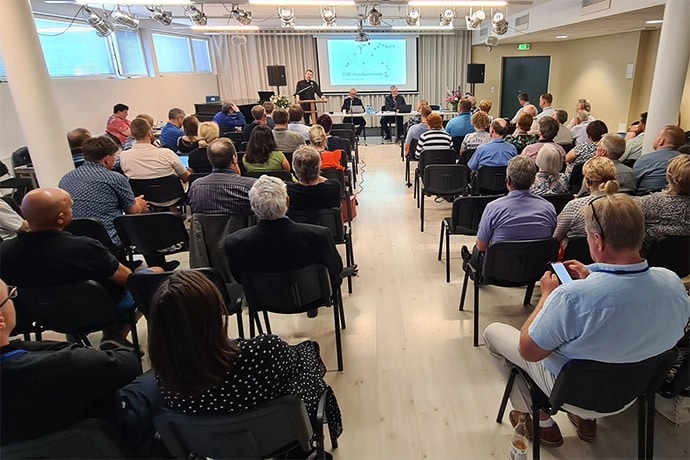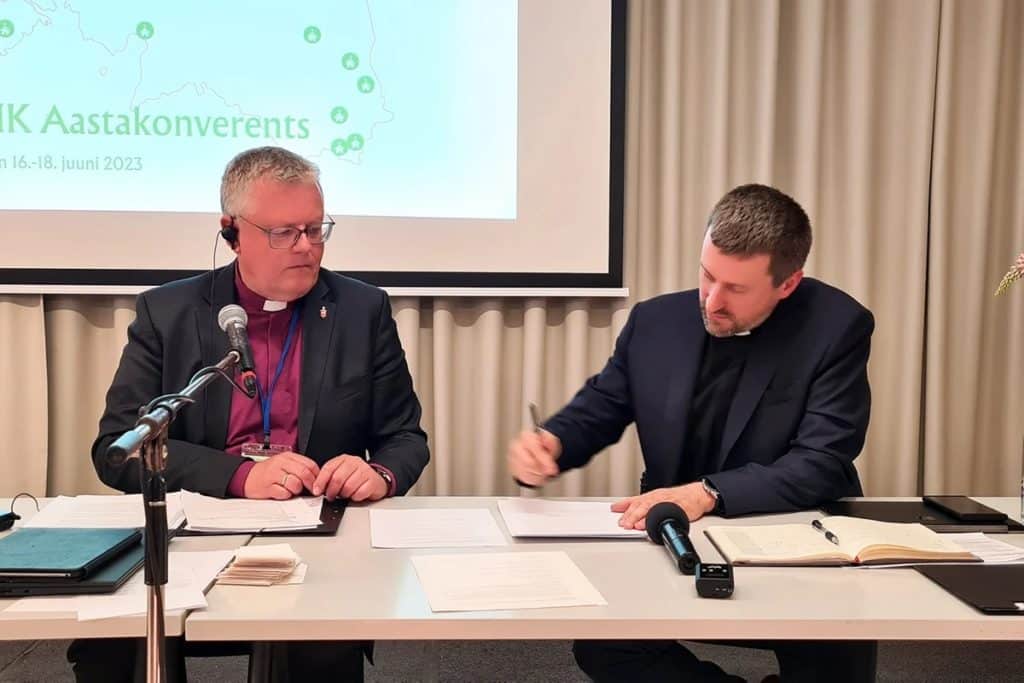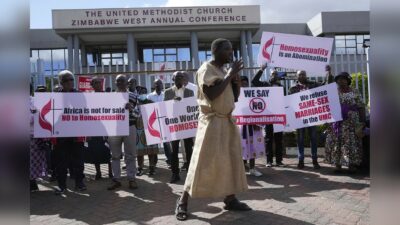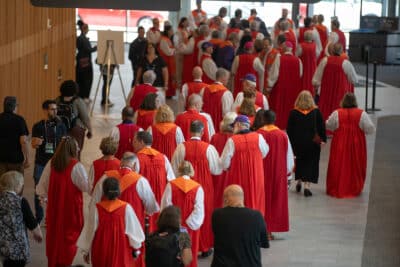The 23 United Methodist churches in the Baltic nation of Estonia are leaving the denomination to form the independent Estonia Methodist Church, as the denomination continues to fracture over LGBTQ issues.
By a 97% majority vote on June 16, the Estonia District affirmed the churches’ decisions to disaffiliate. The district’s voters then directed that church property and assets be transferred to the autonomous Estonia Methodist Church as of July 1.
Among the assets going with the newly created Estonia Methodist Church are several diaconal institutions and the Baltic Methodist Theological Seminary in Tallinn, Estonia’s capital.
United Methodist Bishop Christian Alsted, who leads the Nordic-Baltic-Ukraine Episcopal Conference, described the district conference as solemn and prayerful but also very emotional.
“Personally, the disaffiliation grieves my heart — I find it unnecessary, and I believe it is a loss to the Methodists in Estonia as well as to the entire UMC,” he said in a press statement.
Your tax-deductible gift helps our journalists report the truth and hold Christian leaders and organizations accountable. Give a gift of $30 or more to The Roys Report this month, and you will receive a copy of “What If Jesus Was Serious about the Church?” by Skye Jethani. To donate, haga clic aquí.

“Nevertheless, I respect and honor the decision made by the Estonia Methodist Church, and I stand with my commitment to help all annual conferences, districts and local churches in the Nordic, Baltic and Ukraine episcopal area to live into a future, where they believe they can serve with integrity.”
The district, which has about 1,500 members, is part of the larger Baltic Annual Conference that includes United Methodist churches in Lithuania and Latvia. Remaining in the conference are 18 churches with about 870 members total. Annual conferences are The United Methodist Church’s basic organizing units around the globe.
The Estonian churches’ departure comes as many congregations are withdrawing from the Iglesia Metodista Unida after decades of intensifying debates over biblical interpretation and the place of LGBTQ people in the denomination.
The Book of Discipline, the denomination’s law book, bans the officiating of same-sex weddings and the ordination of “self-avowed practicing” gay clergy.
However, those bans have faced increasing defiance in some parts of the denomination, and many United Methodists in the U.S. and western Europe have been working to eliminate those restrictions.
In 2019, General Conference — the denomination’s top lawmaking assembly — approved a policy that allows churches to leave with property “for reasons of conscience” related to homosexuality if they meet certain procedural and financial obligations.
Since the church law took effect, nearly 6,000 United Methodist churches in the United States, about 20% of U.S. churches, have received the required approvals to disaffiliate. But that policy — the Book of Discipline’s Paragraph 2553 — only applies in the U.S. and is set to expire at the end of the year.
Meanwhile, Estonian United Methodists have expressed deep concern with the direction they see the denomination heading with regards to homosexuality. Last year, Estonian church members supported a resolution expressing their desire to separate from the denomination.
Under Estonian civil law, the church in Estonia could simply leave with property, Alsted said. But Estonian church members wanted to leave “in a peaceful and respectful manner,” the bishop added.

To accommodate that goal, the Northern Europe and Eurasia Central Conference held a special session online in March to vote on a process that would allow for Estonian churches to exit in an orderly way this year.
In doing so, the central conference took advantage of another part of the Book of Discipline. Under the denomination’s constitution, central conferences — church regions in Europe, Africa and the Philippines — have authority to make “such changes and adaptations” to the Discipline as missional needs and differing legal contexts require.
The central conference approved a process that required each Estonian congregation support disaffiliation by at least a two-thirds vote. At least 30% of a church’s professing members needed to be present when the vote took place. Most votes were unanimous for withdrawal, Alsted said.
The district then confirmed the separation when it met in June.
The disaffiliation process also requires the exiting Estonian United Methodist churches to be up-to-date in paying their apportionments — shares of church giving that support ministry beyond the local church. Beyond that, the Estonia Methodist Church does not have to pay any additional compensation.
At the special central conference session in March, delegates also voted to allow the four annual conferences in Russia, Belarus, Kyrgyzstan and Kazakhstan to move forward with another process for leaving the denomination allowed by the Discipline.
The Discipline has a mechanism in Paragraph 572 for entire annual conferences within central conferences to change their relationship with The United Methodist Church. No such process exists for entire U.S. annual conferences to leave.
The four Eurasian annual conferences’ departure will need the approval of General Conference, the denomination’s top lawmaking assembly now scheduled for April 23-May 3, 2024. Their departure won’t be finalized until 2025.
That means the eight delegates from those conferences will be among those voting at the coming General Conference. The four annual conferences — all led by Eurasia Bishop Eduard Khegay — have 66 United Methodist churches and about 1,120 members in total.
Getting to this point has not been easy.
Ahead of the March special session, Nordic, Baltic and Ukrainian members of the central conference’s council jointly developed a proposal aimed at serving needs across Alsted’s area. Under the proposal, the Estonian churches would be able to leave with property at little cost, while the annual conferences that remained in the central conference could set their own standards for ordination and for the solemnization of marriage. The Norway and Denmark annual conferences have long sought to be more open to LGBTQ church members.
However, after much debate, a majority of delegates voted to amend the proposal so only the disaffiliation portion passed.
At the district conference in Tallinn that marked the Estonian churches’ disaffiliation, a different spirit prevailed. During the conference, Alsted and the Rev. Robert Tserenkov, Estonia’s district superintendent, signed an agreement of mutual recognition between United Methodists and Estonian Methodists.
“Each recognizes in one another that they are constituent members of the one, holy, catholic, and apostolic church as expressed in the Scriptures, confessed in the Church’s historic creeds, and attested to in our common doctrinal standards,” the agreement said.
The agreement also commits the central conference and new independent church to collaborate wherever possible in mission and ministry and to welcome each other’s members.
Tserenkov, who will lead the new denomination alongside an elected council until it elects a bishop, expressed his hope for the future. “May God bless and guide the Estonian Methodist Church forward, as he has done by his grace for 116 years!”
For now, Estonia’s move to independence ends support from European United Methodist mission funds, United Methodist missionary services, Central Conference Theological Education Fund grants and other support from United Methodist agencies. The Estonia Methodist Church also will be responsible for developing its own ecumenical relationships.
The new church is already charting its own path. The recent district meeting saw the new church license one local pastor, commission two provisional members and ordain one elder. The Estonian Methodists also celebrated the planting of one new church.
During the district’s ordination service, Alsted offered his hope that the two churches will be like Paul and Barnabas in the Book of Acts after they went in different directions.
“Despite their sharp disagreement and their decision to part ways, God continued to bless them and make their separate ministries fruitful,” Alsted said. “I pray that the decisions made this weekend, as difficult as they were, will lead to fruitfulness.”
Este artículo apareció originalmente en Noticias de la UM.
Heather Hahn is assistant news editor for UM News.





















2 Respuestas
For God’s sake, please stop saying this is about the church’s stance on LGBTQ inclusion; which you did at least 3 times. We have a Bishop practicing witchcraft, we have our official seminaries teaching that Jesus is not the son of God, not God, not the Savior. I have heard these things in person.
We have top seminarians arguing that Jesus didn’t die for our sins and to believe so is deeply offensive. We have top pastors arguing that the Bible is unreliable and needs updated. The LGBTQ stuff is certainly included, but its no greater than 3rd or 4th in the list of important issues, and if it was the only issue, there’d be no schism.
I am a former UMC pastor.
Paul and Barnabas didnt part ways over doctrine. Barnabas wasnt advocating for LGBTQ issues in the first century AD. This behavior was anathema to the followers of Christ. It was sexual sin, condemned by God like adultery.